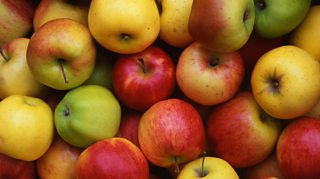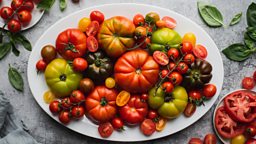How an apple a day really can keep the doctor away
The humble apple is not only an easy snack – new research suggests that eating an apple a day can have a remarkable impact on your body and brain. It can improve the health of your blood vessels, liven up your gut bacteria, benefit your brain, and even reduce your risk of dying early by up to 35%!
In the latest episode of his Radio 4 podcast Just One Thing, Dr Michael Mosley investigates how apples unlock a miraculous molecule in your body, benefiting your health in a number of surprising ways.

Why are apples so good for you?
Dr Michael Mosley explores the benefits of eating apples.
An apple a day
The popular phrase “an apple a day…” has its roots in an old Welsh saying that first appeared in print back in 1866. Originally it was “Eat an apple on going to bed and you’ll keep the doctor from earning his bread!”

Well, it turns out there might be some merit in the saying.
Eating apples regularly is linked to a reduced risk of cancer, diabetes, and heart disease. They're packed full of goodies – fibre, vitamins and important chemical compounds called flavonoids.
The good stuff
Flavonoids are concentrated in the skin of apples. They're produced by plants to protect them from stress, sunlight and disease. Amazingly, by eating these plants, you can acquire similar protective effects!
One of the ways that scientists think flavonoids can have a beneficial effect on our bodies is by increasing the production of an amazing molecule called nitric oxide. It can regulate blood pressure, maintain blood vessel health, and have a number of beneficial effects on your body.
A hearty apple?
In Just One Thing, Dr Catherine Bondonno from Edith Cowan University in Western Australia discusses her research into apples. Her work has revealed that eating apples – specifically with the skin on, where the flavonoids are concentrated – could help reduce blood pressure and improve blood vessel health within a few hours of intake.
Researchers from the University of Reading have also demonstrated that eating apples daily could have an impact on cholesterol levels. They asked participants with slightly high blood cholesterol to eat two apples every day for eight weeks and found that this helped lower their cholesterol to healthier levels. Drinking the juice did not have the same effect.
You should eat the whole apple for the most benefit: our bodies need both the flavonoids in the skin and the fibre in the flesh – and here’s why…
A snack for your gut
Eating the whole apple can change how your gut digests the flavonoids! The fibre decreases the absorption of flavonoids in the small intestine and “increases the amount that reaches the large intestine, where they are broken down by the gut bacteria there,” Dr Bondonno says.
Having one apple a day was linked to a lower risk of dying – by a huge 35%
Furthermore, both flavonoids and fibre can increase the quantity of good bacteria and decrease the quantity of harmful bacteria in the gut! It’s literally good bacteria food.
A fibre called pectin in apples, for example, acts like a “prebiotic”. It helps nourish the good health-promoting bacteria in your gut, such as Lactobacilli and Bifidobacteria. These helpful bacteria can reduce inflammation and help fight off harmful organisms that might cause disease. And flavonoids can lead to the production of short-chain fatty acids which are thought to be beneficial for healthy microbial populations.
Eating apples has a wide range of lasting impacts on the body, all of which can have a significant impact on your long-term health.
The key to longevity
A study by Dr Bondonno following over 1,400 women in Australia over 15 years found that having one apple a day was linked to a lower risk of dying – by a huge 35%.
The results are incredible – extend your life, just with an apple a day! A simple apple can improve your gut, help your heart, and even improve blood flow in your brain to keep it healthy.
Does the type of apple matter?
Deep purple apples have that colour because of the anthocyanins content. But not all flavonoids have a colour, so it’s difficult to tell an apple’s flavonoid content just by colour. Pink or yellow apples can also be high in flavonoids.

Studies have found that the most popular apples with the highest amounts of flavonoids include the Pink Lady and the Golden Delicious.
Stew it, bake it, any way you make it
The good news is that cooking your apples won’t diminish the beneficial flavonoid content, because flavonoids are relatively stable compounds.
So whether you’re enjoying a raw apple as a midday snack, or having a few baked into a crumble – leave the skin on and enjoy the benefits that apples will give you for your gut, your blood vessels, cholesterol levels and your brain.
To find out more about the benefits of apples, listen to the Apple A Day episode of Just One Thing on �鶹�� Sounds.

















































